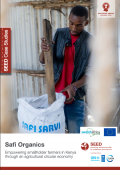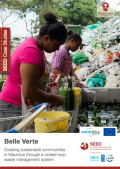




In recent decades, Alberta has experienced significant changes in its climate as well as its economy, population and environment. Mean annual temperatures are increasing and projected to continue to rise in the coming decades—potentially by 2.0°C by the 2030s and 4.0°C by the 2060s (compared to the 1990s) — should...
China's consumption of the world's resources is reaching crisis levels. Unchecked, such levels of consumption and waste would strain the nation and the planet. To prevent the worst scenario, the country is taking action. For the past decade, China has led the world in promoting the recirculation of waste materials...
Renewable energy together with energy efficiency, sustainable transport, sustainable agriculture, sustainable tourism, green building and waste management are economic sectors which are often considered capable of paving the way for a transition to a green economy and providing win-win solutions offering job creation, poverty alleviation and environmental protection. However, there...
The Green Economy is increasingly recognised as a tool to achieve sustainable development. The concept has been adopted by several countries across the globe. In Egypt, one of the main policy objectives is to achieve sustainable development with an emphasis on employment generation, poverty reduction, social equity, and environmental integrity...
This report identifies and assesses best practices for inclusive green growth in Morocco and it focuses on agriculture, energy and waste management. The report contributed to informing the Fifth Issue of the Sustainable Development Report on Africa, which was produced under the theme "Promoting sustainable development in Africa through inclusive...
This report is an attempt to demonstrate the feasibility of implementing a green growth strategy in Karnataka. There are five case studies covered in this report; electric vehicles, waste heat recovery, wind energy, solar energy and micro-irrigation. All these opportunities have the potential to make significant positive impacts in meeting...
